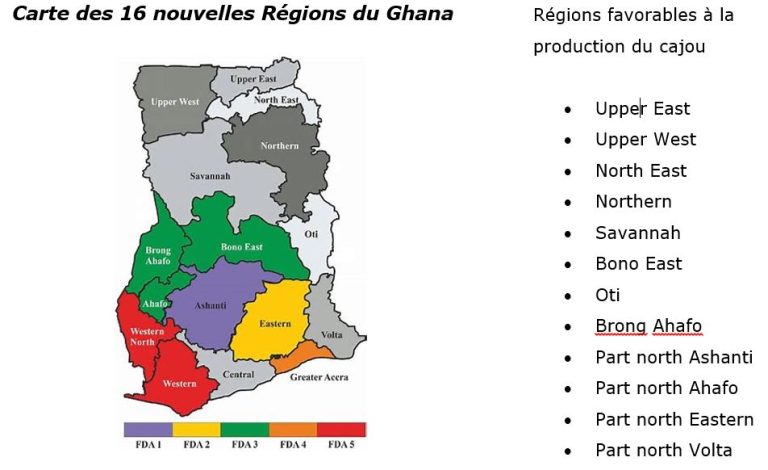Ghana joined the CICC and signed its Constitutive Convention on 5 July 2017 in Abidjan, through the Honourable William Agyapong Quaittoo, Minister of Food and Agriculture. Since the establishment of the CICC, Ghana has participated in all sessions of the Council of Ministers of the Institution, except the one held in Ouagadougou in December 2019.
Currently, the Honourable Dr. Bryan Acheampong, Minister of Agriculture and Food and the Honourable Kwabena Tahiru Hammond, Minister of Trade and Industry, are sitting on the Council of Ministers in respect of Ghana, in accordance with the Convention establishing the Institution.
Economic, social and environmental profile
Ghana is a country in West Africa with an area of 238,530 km² for an agricultural land percentage of 35.1%. The population is estimated in 2021 at 31,732,128 inhabitants for a population growth of 2.1%. The world GDP and GDP per capita are respectively 77.59 billion USD and 2,445.3 USD in 2021, according to the World Bank. The climate of Ghana is tropical, with two main seasons: the wet season and the dry season. Northern Ghana experiences its rainy season from April to mid-October while the south experiences its rainy season from March to mid-November. Ghana’s tropical climate is relatively mild for its latitude. The harmattan, a dry desert wind, blows over northeastern Ghana from December to March, lowering humidity and causing warmer days and cooler nights in the north. Rainfall amounts range from over 2,000 mm in the south to 900 mm in the north. Ghana is subdivided into five agro-ecological zones classified as coastal savannah, dense forest, dry forest, transition and savannah. The ecological conditions in the last three zones of the country are favourable for cashew cultivation.
The cashew sector in brief
Cashew is mainly produced in 13 of the 16 regions of Ghana, although it is mainly found in Bono, Bono East, Savannah, Northern, North East, Oti, Volta, Upper East and Upper West regions. With a view to promoting the fruit products sector in Ghana, reducing land pressure and monitoring their environment through the availability of reliable statistics, Parliament on 28 December 2019 passed the Tree Crops Development Authority (TCDA) Act which becomes a regulatory and institutional framework to develop and regulate the production, processing and marketing of six tree crops, including cashew. To mark the government’s commitment to support the reform, on Tuesday 29 September 2020, in what has become the most significant initiative in the tree crops sector to date, the President of Ghana, Nana Addo Dankwa Akuffo Addo, officially inaugurated the TCDA headquarters in Kumasi. In Ghana, the areas covered by plantations are estimated at more than 234,171 hahectares for a production of around 200,000 tonnes in the 2021/2022 season. The number of producers is estimated at 200,000, 10% of whom are women. Ghana has the highest production yields in West Africa of around 900kg/ha thanks to research and extension efforts aimed at promoting cashew production. To date, 08 processing units have been installed for a cumulative capacity of 65,000 tonnes with an estimated utilization rate in 2022 at 49.93%. Ghana exported a volume of raw nuts equivalent to 199,977.2 tonnes at a farm gate price of GH₵6.5/kg.
Sector organization
In Ghana, the Tree Crop Development Authority (TCDA) is the regulatory or governance authority for the tree crop sectors, including cashew. The TCDA is under the administrative authority of the Ministry of Agriculture. In addition to this regulatory body, the sector is mainly supported by the Ministry of Agriculture for production aspects and the Ministry of Trade and Industry for processing and marketing. Private sector players are grouped into associations, including the Cashew Processors Association of Ghana (CPAG), the Cashew Traders and Exporters Association, the Cashew Producers Association and the Cashew Council of Ghana (CCG), which is the apex body of the sector.
Incentives for the promotion of cashew nuts
To sustainably promote the cashew sector, Ghana has taken a number of measures, including:
- The enabling environment facilitated by the government;
- National distribution of improved seedlings to producers;
- Strong support for research;
- Strong support for popularization;
- Fixing the minimum price;
- Varietal research and development;
- Technical support for farmers;
- Continuous recording of all actors by biometrics;
- Export quality regulation initiated;
- Support for local processors to secure RCN stock for processing;
- Supporting local processors with subsidies.
Cashew nut promotion projects and programs
Projects and programs | Execution period | Sources of funding | Areas of intervention | Implementing institution | Forecast budget (USD) |
Cashew Nut Development Project | 2002-2010 | BAD | The entire value chain | Ministry of Food and Agriculture | 15,543 |
Trilateral cooperation | 2017-2019 | CHALK | Cashew nut research and apple processing | Ministry of Food and Agriculture | 789,297.00 |
Planting for export and rural development (PRDE) | 2017- Date | Gog | Production | Ministry of Food and Agriculture | 40,441,689.29 |
MOVE/GIZ (ex-ComCashew) | 2009 | BMGF | The entire value chain | GIZ | ND |
Note: The PRDE project covers all tree crops, including cashew nuts.
Institutions and persons representing the CCPI
Ghana is represented in the CCPI by:
- The Ministry of Food and Agriculture. Representative: Mr. JERRY J. ANIM, Deputy Director of Agriculture, animjjerry@gmail.com .
The Ministry of Trade and Industry. Kwesi Ofori Antwi, Deputy Director, kwesigh@hotmail.com .
Geographical location of cashew nut production


